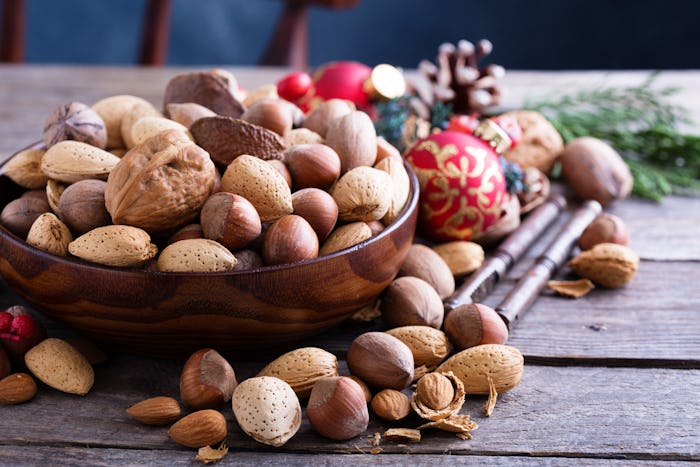Crack Down

If You Have Toddlers, Keep Them Away From The Holiday Nut Bowl
Just put the walnuts away, Great-Aunt Shirley.
The holidays are all about fun traditional foods, from special, seasonal cookies to creamy eggnog. One funny food that always seems to come out around the holidays is that random bowl of whole mixed nuts with a cracker. There are some cultures with a bit of mythology around nuts (cracking a bad walnut means bad luck for the new year, yikes), and for some, the nut bowl just gives you something to do with your hands at the Christmas party. But when can toddlers eat whole nuts? And what about allergies? Should the holiday nut bowl be giving you this much anxiety?
Here, a pediatric allergist explains why you should go to the trouble of asking your family to put their nuts away (though maybe phrase it a little differently depending on the crowd).
When can toddlers eat whole nuts?
Pediatricians and the American Academy of Pediatrics (AAP) recommend keeping whole nuts away from kids until at least age 4 because they’re a choking hazard. You may even want to make it age 5, says Dr. Amy Stallings, M.D., pediatric allergy and immunology specialist at Duke Health.
“As pediatricians, we usually recommend avoiding whole nuts until they’re at least 4 to 5 years old. If you have toddlers at the party, you would want whole nuts to be out of reach for little kids,” she says.
“Mixed nuts and nuts are one of the top 10 choking hazards for babies and toddlers,” says Rainie Robinson, a registered dietitian at Children’s of Alabama. “Whole nuts should not be given to children under 4 years old. Remember that even though toddlers have some teeth, they are still learning to chew and grind food appropriately.” Waiting until your child is school-age ensures they have all the teeth they need to chew up nuts well and the focus to chew them thoroughly before trying to swallow.
Should I worry about nut allergies?
Some children with nut allergies are sensitive to more than one kind of nut, and others are only allergic to one type, according to the AAP. So, even if you’ve followed all the guidelines for introducing your baby to peanut butter early to prevent allergies, it could be a pecan that poses an issue. Even if your child has been eating almond butter with no allergic reactions, have they ever tried something made with Brazil nuts before? Unless you’re confident your child isn’t allergic to anything in the bowl, steer clear of the whole mix, especially if they have a known nut allergy.
“A lot of toddlers will have had peanut butter, but they may not have had walnuts and pecans and cashews and pistachios, and Brazil nuts are less common,” says Stallings. “What you absolutely don’t want to happen is for a parent, grandparent, or family member to think that they can pick the peanuts out and give it to a kid that has had peanuts before because that’s not safe. They’ve been mixed with other nuts, and you don’t know if the other nuts are safe for that kid. There’s going to be cross-contamination, so mixed nuts are a concern for any kid with nut allergies.”
If your child does have an allergic response to mixed nuts, it would also be difficult to determine which nut was responsible, Robinson says. “Choose foods you know your baby or toddler is safe to eat and follow the recommendations for safe feeding, such as using a high chair and dedicating your attention to the child during feeding.”
Parents of kids with allergies are already extra vigilant around the holidays, when lots of homemade dishes (without ingredient labels for them to check) hit the table. If you’re worried about your child having a bad reaction to nuts, don’t hesitate to ask the cooks if there are nuts in any dressings, stuffings, or other dishes, Stallings says.
So, yes, unfortunately parents do have to stress a little about the random holiday nut bowl that always appears this time of year. Just ask your relatives to keep them up high out of your child’s reach, and make sure no well-meaning grandparents slip your kid a whole pecan when you’re not looking.
Experts:
Dr. Amy Stallings, M.D., pediatric allergy and immunology specialist at Duke Health
Rainie Robinson, a registered dietitian at Children’s of Alabama
This article was originally published on